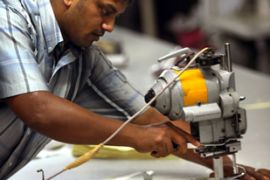EU ends Sri Lanka trade benefits
Colombo braces for drop in exports as EU’s withdrawal of tariff concessions takes effect.

“The EU’s decision to press ahead with the removal of trade benefits shows how the [civil] conflict continues to cast its shadow over the country,” Al Jazeera’s Minelle Fernandez reported from Colombo, the capital.
EU ‘punishment’
When the trade concession came up for renewal last year, Sri Lanka’s government refused EU demands for a probe into war crimes allegedly committed in 2009 during the last months of the country’s ethnic civil war.
|
“It is high time that the EU stops bullying Sri Lanka, which did a great job in fighting terrorism, and is now being punished for it” Rajiva Wijesinha, Sri Lankan MP and former secretary of the human rights ministry |
“It is high time that the EU stops bullying Sri Lanka, which did a great job in fighting terrorism, and is now being punished for it. It is appalling,” Rajiva Wijesinha, a Sri Lankan MP and former secretary of the human rights ministry, said.
“The EU has intended it as a form of punishment, but I don’t think this will work,” he added.
Ajith Nivard Cabraal, the head of Sri Lanka’s central bank, told Al Jazeera that he is confident that his country would be able to absorb the withdrawal of the concession.
“We have prepared for this end of the war scenario for some time now and that is why we are able to move towards this new era with a lot more confidence,” Cabraal said.
Business executives were less optimistic and said they understood EU concerns, but also warned that cancelling tax breaks in return for commitments on social and rights issues would achieve little.
The loss of the concessions comes as Sri Lankan exporters are already reeling from a weak recovery in Western markets and thin profit margins.
‘$500 million loss’
Companies say withdrawing GSP+ will hurt most of Sri Lanka’s apparel industry, which is the country’s biggest industrial export sector and employs over a million people in 250 factories clustered around Colombo.
“We will lose around $500 million from our annual earnings of just under $3 billion,” said Rohan Masakorale, secretary general of the Joint Apparel Association Forum (JAAF), an industry body.
JAAF says some European buyers may pick up the extra 10 per cent in taxes or share it with local manufacturers, but others may shift their business to rival countries.
“Some factories [in Sri Lanka] may close, there will be more consolidation going forward,” Masakorale said.
Currently 45 per cent of garments are shipped to US buyers like Victoria’s Secret and Masakorale says the forum is pressing the government to strike new trade deals with Japan, Australia, Brazil and Russia.
“We are looking at different markets and trying not to depend on the EU. Even a five per cent increase in other markets would help,” Masakorale said.